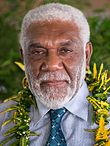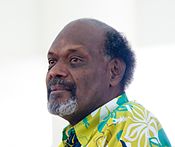Vanuatuan general election, 2016
|
|
|||||||||||||||||||||||||||||||||||||||||
|---|---|---|---|---|---|---|---|---|---|---|---|---|---|---|---|---|---|---|---|---|---|---|---|---|---|---|---|---|---|---|---|---|---|---|---|---|---|---|---|---|---|
|
|||||||||||||||||||||||||||||||||||||||||
|
All 52 seats in the Parliament of Vanuatu |
|||||||||||||||||||||||||||||||||||||||||
|
|||||||||||||||||||||||||||||||||||||||||
|
|||||||||||||||||||||||||||||||||||||||||
Sato Kilman
People's Progress Party
Charlot Salwai
Reunification Movement for Change
Vanuatu held general elections on 22 January 2016. The previous elections occurred in October 2012. The president of Vanuatu, Baldwin Lonsdale, dissolved the Parliament of Vanuatu in November 2015. This occurred after the conviction of 14 parliamentarians for bribery. The convicted MPs include former Prime Ministers Serge Vohor and Moana Carcasses Kalosil. The president called for a snap election to form a new government.
Vanuatu has a unicameral parliament with 52 Members of Parliament. The people elect their members by voting for one candidate. In multi-member constituencies, Vanuatu uses the single non-transferable vote system and in single-member districts, first-past-the-post voting is used. Each parliamentarian holds office for a term of 4 years. In Vanuatu, there are eight single-member districts and nine multi-seat constituencies. The district magnitute of multi-seat constituencies has a range of two members to seven members for each constituency. Citizens elect the President of Vanuatu and the government elects the Prime Minister of Vanuatu.
Historically, the Vanuatuan government and society divided itself along linguistic lines. The Vanua'aku Party represented the Anglophone interests and the Union of Moderate Parties represented the Francophone interests. Over time the linguistic divide has diminished as Vanuatu established a stronger national identity post-independence. Party allegiances have become less strong as factions split and formed new political parties.
...
Wikipedia



